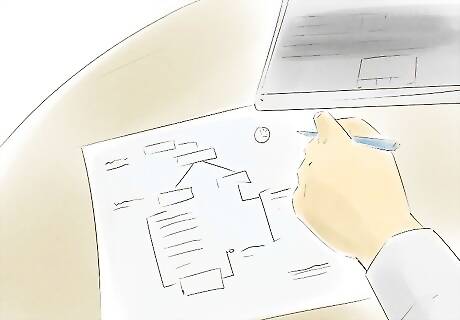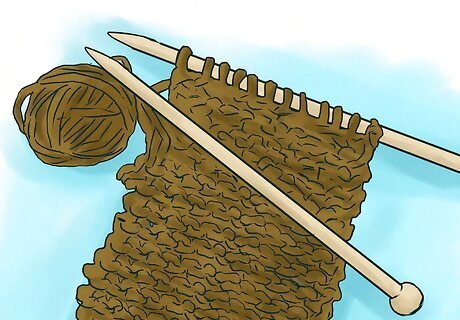
views
Deciding What You’re Going to Complete

Complete a cost-benefit analysis. Similar to weighing the pros and cons, a cost-benefit analysis is a technique that helps you make sound decisions, namely those that involve financial risk. If you are weighing the benefit of finishing a home remodel, completing a degree, or traveling around the world, performing this analysis can help you decide. First, you need to make a list of the costs associated with the unfinished task. For instance, if you are deciding whether you should complete a home remodel, figure out the exact amount of cash needed to do so. You might include supplies, labor, and the cost of renting another home while the work is done. Then, you will write out the benefits of the project. These might include “increasing your home’s value” and “having more space for entertaining guests.” If you can, try to determine the value of these benefits. For instance, how much would your home’s value go up with a remodel? Finally, you will need to compare the two costs to determine if the project is worth it to you. If your home remodel would cost $30,000, but it would only raise the value of your home by $20,000, you need to figure out if the excess cost is worth it to you in having more space, having updated appliances, etc.

Pick what will take the least amount of time to finish. Starting projects that are difficult and take a while to complete can make you feel overwhelmed and discouraged. Instead, begin the process by completing tasks that you can get done rather quickly. Getting the easy projects out of the way may help you build momentum and provide encouragement for completing the others.

Throw away projects you don’t enjoy. If you are able, ditch the projects that you don’t enjoy or have completely lost interest in doing. Although this probably doesn’t apply to work projects, ridding yourself of incomplete tasks that you have no intention of ever finishing clears up physical and mental clutter. It also allows you to move on and focus on what you actually would like to finish. Letting go may be difficult, so you’ll need to be honest with yourself about what you’ll realistically finish. If you haven’t touched the project in six months or so, or haven’t thought about it—and don’t care to—then it’s probably safe to say you won’t ever complete the project, and don’t want to.

Keep projects that you’ve invested in. If you've dedicated a good amount of time or money to a project, see it through. Not finishing a task that you already spent lots of time and money on is essentially like throwing your money away. You spent time on it that you could’ve used for other things, and you’ve used money on it that could have gone elsewhere. Deciding to complete these projects can give you the satisfaction that you may need in order to press on.
Getting the Job Done

Set milestones and deadlines. Decide on a date in which you want the project completed and write it down in your calendar. Then pick dates along the way when you want certain tasks completed. If possible, give yourself plenty of time by selecting a timeframe that is achievable. Setting dates that are unrealistic may put too much pressure on you and cause you to become discouraged if you don’t reach them.

Start your task for two minutes. You may not complete a project because you are unsure of where to begin. A simple way to start is to do something productive towards it for two minutes. You may find that this little bit of time is all you needed to get the ball rolling. For instance, if you want to finish a painting but are unsure of where to start, paint a quick scene on a separate sheet of paper for a few minutes. This may get the creative juices flowing and allow you to finish your project.

Consider why you put things off. If you have a habit of leaving things undone, you might want to start looking at your reasons for putting things off. There may be a variety of reasons why you have put off doing something, which may include lack of time, resources, or interest. Think about why you have put off the projects that you have and try to determine if there is anything you can do to overcome these obstacles. For example, if you have put off finishing a paper for a class, then maybe it is because you feel like you don’t have enough to say or because the project is difficult. To tackle this project, you could meet with the teacher or professor to discuss your concerns and find a way to move forward. Or, if you have put off a project at home, such as assembling a new piece of furniture, then you might cite your reasons for putting it off as lack of time or energy. Perhaps you could set a time to assemble the furniture and ask a friend or family member to help you.
Identify your reasons for wanting to complete a project. Sometimes, in the midst of a long project, you may become disconnected from the reason you wanted to complete the project in the first place. Write down the core reasons you want to get this project done and your list might serve as motivation. For example, if you are working on a college degree, then you could write down the reasons why completing your degree is important to you.

Celebrate small wins. A helpful tactic to keep yourself inspired while completing a project is to pat yourself on the back for incremental successes. This is especially handy if the task you are trying to complete takes a long time—time in which you willpower and motivation will gradually dwindle. Celebrate the miniature accomplishments along the way to boost morale and keep yourself forging ahead. For instance, if your goal is to complete a certification course, you might celebrate the act of signing up and enrolling. Then, you might celebrate again after completing your first week of assignments, and so forth.
Identifying and Adjusting Behaviors

Spot and plan for procrastination triggers. When you are aware of the triggers that drive you to procrastinate you can come up with a plan to overcome them. Look for common themes in your behaviors that generally lead to you procrastinating. Then, figure out a course of action to avoid this trigger. If you know that feeling overwhelmed by a big task increases the odds of you putting it off, take action to prevent this from happening. For example, you have to complete a book report and then prepare a presentation on your report. You might break the task down to make it more manageable. First, you might conduct research. Then, complete an outline, a first draft, second drafts and a final report. Then, you might take notes from your report to develop an outline for the presentation. Then, flesh out the presentation. Finally, you will want to practice it aloud and tweak it as needed.

Say “no.” Part of the reason you may have so many unfinished projects is that you take on too many because you don’t want to turn any away. To prevent this, you’ll simply have to learn how to say “no.” Taking on too many tasks is one of the simplest ways to feel overwhelmed and bogged down by projects, instead of enjoying them. Simplifying your life and only taking on what you want to and can, may help you stop leaving things unfinished. If a friend asks you to help with a new community event, or your coworker wants your expertise on a project, decide if you truly want to participate. If not, say “I’m sorry, but I’ve got my hands in a lot of projects right now. I won’t be able to help this time.”

Get support and accountability. Positive peer pressure can be just the thing you need to help you complete unfinished tasks. Surround yourself with a support network of positive people who get things done. Then, find one of them to serve as an accountability partner. Or, you can simply make a public announcement of your goals and update the group as a whole.

See a therapist for chronic procrastination. Sometimes, no matter how hard you try, you cannot beat your problem on your own. Even with the right strategies in place and with support, you still might have trouble completing tasks due to a deeper issue, such as anxiety, ADHD, or low self-esteem. It can help to see a professional for consistent problems getting things done. A therapist can help you find the source for your procrastination and develop practical strategies for overcoming the underlying issue. Talk to your primary care doctor for a referral or research a therapist in your local area.
Understanding the Consequences of Unfinished Projects

Know that you are sacrificing your time. You can complete individual projects as they arise, or it will take longer to complete everything. Taking on one project at a time means that you make some progress with your projects, even though it may seem slow. Moving onto another before you are finished with what you are working on, however, results in you having nothing fully completed, and a lot of work that still has to be done. Knowing that you have many unfinished projects hanging over your head is often discouraging, and can prevent you from becoming motivated.

Recognize that incomplete projects take up space. Finish home projects, or you run the risk of clutter. Perhaps you started knitting a blanket, but lost interest. Maybe you began a painting project, but decided to move on. Instead of having completed projects in your home, you’re left with clutter around you. Clutter can make you feel suffocated in your home, which may eliminate any motivation you have to complete your projects. Some people may think that placing unfinished items around their home may offer a reminder to work on them. However, this often just adds to the clutter, as these matters are rarely resolved. Often, they are pushed to the side and then lost under more clutter.

Realize that incomplete projects detract from peace. Work on your unfinished items, or you’ll likely become stressed. If you’re like many, the thought of having incomplete projects makes you stressed. The situation creates lots of pressure on you that you simply don’t need. You may feel weighed down by the unfinished business, which can prevent you from fully enjoying life. In addition, this stress can also impact those around you such as partners, kids, friends, and coworkers. These people may be directly affected by your procrastination, or your lack of getting things done can take away from your relationships.

















Comments
0 comment